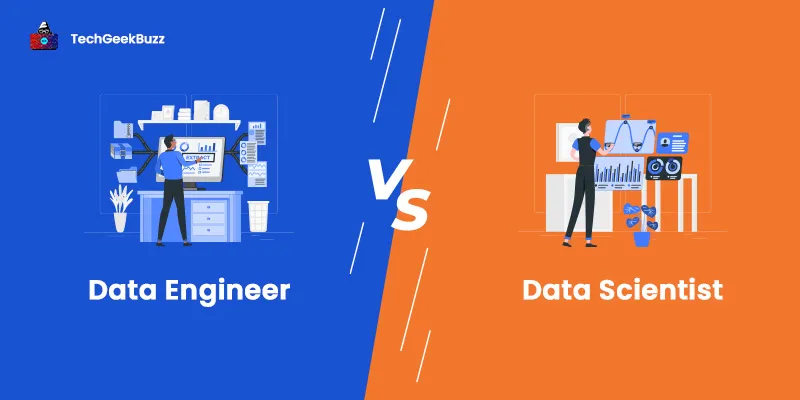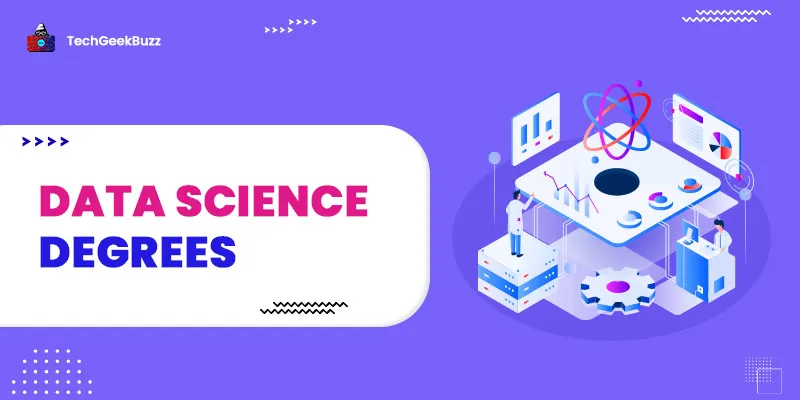Big data has changed the way businesses operate. It has become new oil among organizations and is powering the world. With overwhelming amounts of data generated each day, companies and organizations rely on it to constantly improve their products and/or services and make more informed business decisions.
For organizations to make actionable decisions using data, the role of data engineers and data scientists comes into the picture. Both these job roles, data engineer and data scientist, belong to the same team whose responsibility is to collect data, clean it, and transform it into actionable insights. Later, organizations use these generated insights to make lucrative business decisions.
In this blog post, we are going to expand your knowledge on the job roles of data scientist and data engineer and the differences between them.
So, let us get started!
Who is a Data Engineer?
A data engineer is an IT professional responsible for creating, designing, and maintaining data infrastructure to collect, transform, and manage data. They create data pipelines that collect from multiple sources. In addition, they integrate and clean raw data and transform it into a usable format. Later, data scientists or data analysts leverage this transformed or structured data for analysis.
In simple words, a data engineer is a professional whose primary job is to prepare data for analysis purposes. Moreover, data engineers are responsible for optimizing the big data ecosystem of their organizations and making data available to everyone within the organization.
Roles and Responsibilities of a Data Engineer
The following are the three main roles of a data engineer:
-
Generalists
The role of data engineers is to work with small teams that perform end-to-end data collection and processing. They get involved in each and every step of the processing of raw data, from collecting and cleaning to transforming it into a usable format.
-
Pipeline-Centric Engineers
Pipeline-centric data engineers primarily work with mid-size teams or organizations. They are responsible for working with more complex data science projects across distributed systems. In addition, pipeline-centric data engineers and data scientists work hand in hand to leverage the data to its fullest.
-
Database-Centric Engineers
Database-centric data engineers work with large organizations and teams where vast volumes of data are present across multiple databases. They are responsible for implementing, maintaining, and populating analytics databases. Also, they are tasked with tuning databases for analysis, working with data pipelines, and using Extract, Load, and Transform (ETL) methods to create table schemas.
As discussed earlier, data engineers provide usable data to data scientists and the analytics team for the analytics operations. Some other responsibilities of a data engineer are as follows:
- Gather raw or unstructured data from heterogeneous sources.
- Integrate and analyze the collected raw and unstructured data.
- Develop data pipelines and systems.
- Prepare usable data for data scientists for predictive and perspective modeling.
- Understand the hidden trends and patterns in data.
- Analyze business objectives and requirements.
- Identify various ways to improve the quality and reliability of data.
- Analyze complex data and prepare the result report for the same.
- Automate tedious and mundane tasks using the collected data.
- Create effective machine learning algorithms and techniques for research purposes.
Who is a Data Scientist?
A data scientist is an IT professional responsible for analyzing data provided by data engineers, uncovering hidden trends and patterns from it, and helping businesses make better decisions. Therefore, data scientists are dependent on data engineers since they analyze data that data engineers collect and transform into a usable form.
In simple terms, a data scientist analyses huge amounts of data to extract meaningful insights that help organizations make actionable decisions. Data scientists leverage advanced techniques, including clustering, decision trees, and neural networks to discover hidden patterns.
As mentioned earlier in this post, data scientists and data engineers are part of the same team, along with data analysts, data scientists are responsible for leading the team. Also, they need to possess the skill set of data engineers and data analysts.
Roles and Responsibilities of a Data Scientist
The following are the roles and responsibilities of a data scientist:
- Leveraging usable data provided by data engineers and performing in-depth analysis.
- Uncovering hidden patterns and trends from data by analyzing it.
- Performing the preprocessing of structured and unstructured data.
- Developing predictive models and machine learning algorithms using data.
- Proposing various solutions and strategies to solve business problems.
- Collaborating with business and IT teams.
Data Engineer vs Data Scientist - How Do They Differ?
Now that we know who exactly are data engineers and data scientists and their roles and responsibilities, we shall now differentiate between them. But before that, let us discuss some similarities between them.
Both data scientists and data engineers are from computer science, information technology, computer engineering, physics, or mathematics backgrounds. Also, they both are proficient in various programming languages, including Python, R, Java, Scala, C++, SQL, Julia, and JavaScript.
Data Engineer vs Data Scientist - Job Profile
The foremost difference between a data engineer and a data scientist is their roles and responsibilities. Data engineers are responsible for creating and maintaining infrastructure for data generation and data pipelines. They collect data from multiple sources, integrate it, clean it, and transform it into a usable form. Moreover, they create data pipelines using big data tools and frameworks.
On the other hand, data scientists uncover hidden patterns and trends from the collected data using statistical and mathematical techniques. They primarily focus on identifying business problems and proposing effective solutions.
Data Engineer vs Data Scientist - Skills
The skillset of data engineers and data scientists vary slightly. In addition, their level of skills also varies. For instance, the analytical skills of data scientists are more profound than data engineers.
Here are the essential skills of a data engineer:
- Programming languages, including Python, R, Java, Scala, Perl, Ruby, and MATLAB
- Data warehousing
- Database design and configuration
- Operating systems
- Basics of machine learning
- Data analysis
The following is the skillset that every data scientist should have:
- Programming languages, including R, Python, Java, Perl, Scala, Ruby, and MATLAB
- Machine learning and deep learning
- Data wrangling and data storytelling
- Data visualization
- Statistics, probability, and mathematics
- Linear algebra and multivariate calculus
- Database management
Data Engineer vs Data Scientist - Tools
When it comes to tools, data engineers leverage the following tools
- Distributed systems
- Data pipeline tools, such as Apache Kafka, IBM InfoSphere DataStage, Pentaho, and Talend
- Big data frameworks , such as Apache Spark, Hadoop, and Hive.
Data scientists use the following tools to accomplish their responsibilities:
- Advanced analytics and business intelligence (BI) tools, such as Power BI, Tableau, QlikView, Splunk, Rapidminer, and KNIME
- Machine learning libraries like Keras, TensorFlow, PyTorch, Caffe, Theano, and DLib
Data Engineer vs Data Scientist - Average Salary
Since companies and organizations constantly search for skilled data engineers and data scientists to manage their data-driven operations, they hire them with attractive packages. Let us throw light on the average salaries of data engineers and data scientists in various countries.
Data Engineer Salary
|
Country |
Average Salary Per Annum |
|
India |
? 9L |
|
United States |
$ 100K |
|
The United Kingdom |
£ 48K |
|
Germany |
€ 64K |
|
Canada |
CA$ 88K |
|
France |
€ 45K |
|
Australia |
AU$ 100K |
Data Scientist Salary
|
Country |
Average Salary Per Annum |
|
India |
? 10L |
|
United States |
$ 100K |
|
The United Kingdom |
£ 47K |
|
Germany |
€ 63K |
|
Canada |
CA$ 87K |
|
France |
€ 45K |
|
Australia |
AU$ 100K |
Data Engineer vs Data Scientist - Table Form
The following table highlights the major differences between a data engineer and a data scientist:
|
Data Engineers |
Data Scientists |
|
They are the architects of data. |
They are the builder of the plan that data engineers prepare. |
|
Data engineers are responsible for collecting, integrating, cleaning, and transforming raw data into a usable form. |
Data scientists are responsible for analyzing the data that data engineers provide them in a usable form. |
|
They are only dependent on managers. |
They are dependent on data engineers for data. |
|
Companies and organizations do not involve data engineers in the decision-making process. |
Organizations and companies consider the insights that data scientists extract from data provided by data engineers. |
|
Data engineers work with raw and unstructured data. |
Data scientists work with structured data that data engineers provide. |
|
There is no need for data engineers to possess data storytelling skills. |
It is essential for data engineers to possess data storytelling skills to convey the results of data analysis to other people. |
Conclusion
Though data engineers and data scientists are entirely different and have different job roles, both are necessary for an organization or company. Data engineers collect and transform raw and unstructured data into a usable format, while data scientists use that data to perform analysis and extract hidden patterns and trends.
Furthermore, they work as a team and are incomplete without each other. Also, they complement each other and help organizations make more actionable and lucrative business decisions.
We hope you found this article helpful in understanding the difference between data engineers and data scientists.
People are also reading:




